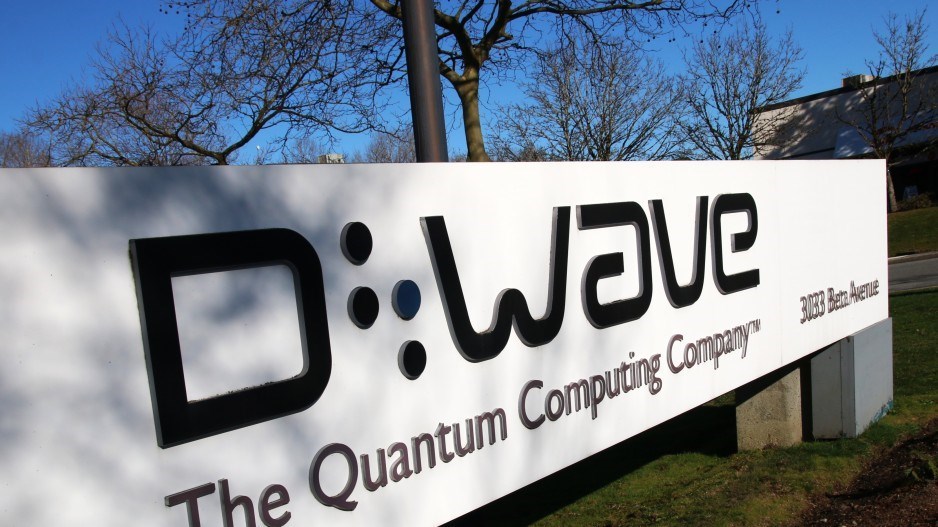A consortium that includes B.C.’s D-Wave Quantum Inc. (NYSE:QBTS) and the University of Northern British Columbia has nabbed $1.9 million in funding from Digital, an independent, Vancouver-based funding partner formerly known as the Digital Technology Supercluster.
Digital’s investments always come with the expectation that funding recipients invest the same amount of money or more.
In this case, the consortium, led by Alberta-based Verge Ag, is expected to contribute $3 million, for a total project cost of $4.9 million.
Others involved with the project include the Prairie Agricultural Machinery Institute and Mitacs.
The project aims to advance agricultural technology that includes quantum computing.
“The project represents one of the world’s first, if not the first, customer-facing, real-world product powered by quantum computing with previous quantum-computing applications being for large organizations in internal optimization,” Digital said in a statement.
Quantum computing has been the hottest technology niche in the past several months – hotter even than artificial intelligence (AI).
Shares in D-Wave closed October trading at US$1.06 per share. Two months later, it ended the year trading close to eight times higher, at US$8.40. The company has significant operations in Burnaby, which was its head office before it officially moved its head office to Palo Alto, California. Its subsidiary D-Wave Systems remains based in Burnaby.
Other quantum-computing companies, such as IonQ Inc. (NYSE:IONQ), Quantum Computing Inc. (Nasdaq:QUBT) and Rigetti Computing Inc. (RGTI), saw similar share-price surges to end 2024, and have seen share prices fall since.
Influential technology executive and Nvidia Corp. (Nasdaq:NVDA) CEO Jensen Huang may have popped the quantum-computing bubble at the CES 2025 conference in Las Vegas in early January by saying that practical quantum-computing use was decades away.
"If you kind of said 15 years... that'd probably be on the early side,” he said in a speech at the conference. “If you said 30, it's probably on the late side. But if you picked 20, I think a whole bunch of us would believe it.”
Quantum-computing companies' shares had started to skyrocket when investors appeared to suddenly understand the story of how quantum computing is set to be the next step in computing.
Computers are now based on binary operations. Computer chips have billions of transistors, with each having a what techies call a "bit" of data. Those bits have two states: on or off. Quantum computers' qubits can have multiple states. As a result, they process data much faster and significantly improve users' ability to complete complex cryptography, among other tasks, and do so much faster.
D-Wave’s shares on Friday, before the U.S. long weekend, closed at US$5.27 each, down 37.3 per cent since the start of the year.
Digital today announced a combined $2.8 million in funding to two other consortia as well, although they do not involve B.C. companies.
How Digital helps technology partners
The federal government created five of what it called “superclusters” in 2018. Digital is based in Vancouver whereas the other four are located in cities across the country. All of those superclusters partner with companies across Canada.
Each has distinct niches. Digital’s areas of focus, for example, are:
- AI and health
- natural resources, and
- talent, CEO Sue Paish told BIV.
The Ocean supercluster, based in St. John’s, N.L., invests mostly in ocean-based technologies whereas Montreal’s supercluster is known as Scale AI, and its focus is as its name suggests: AI. The protein industries supercluster is based in Regina, whereas the advanced manufacturing one is based in Hamilton.
The superclusters' aim is to leverage investments. As such they tend to require that investee companies contribute at least as much to a project as the supercluster does.
Digital gets most of its funding from the federal government but it also gets some money from the B.C. government, Paish said. It has made many investments with B.C. companies.
One of its bigger investments was to a consortium led by Richmond-based Ideon Technologies last year. That was for $16 million over three years. Ideon uses AI to help mining clients by taking information gleaned from old maps, old rock-sample data, images and other sources to create a more fulsome map of sub-surfaces.
Vancouver-based health-care provider and technology developer Well Health Technologies Corp. (TSX:WELL) and partners last summer nabbed $15.3 million in funding from Digital, over three years, for a $44-million project to develop AI technology that performs tasks such as screening patient medical records and suggesting possible diseases, which saves doctors time.
Vancouver-based Metaspectral uses AI to automate how clients can sort consumer plastics, improving efficiency, reducing costs and increasing the quality of recycled materials. It leads a consortium that received $2.6 million from Digital in 2023.



